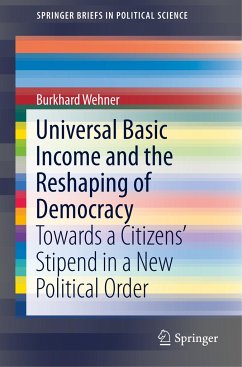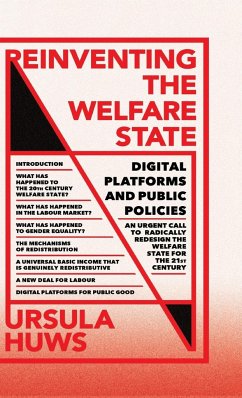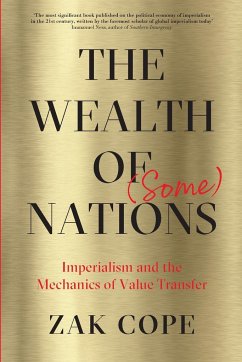
Determining the Value of Universal Basic Income
Political Feasibility, Ecological Impact, Economic Realities, and Research Methodologies
Herausgegeben: Merrill, Roberto; Moiteiro das Neves, Ana Catarina
Versandkostenfrei!
Versandfertig in 6-10 Tagen
38,99 €
inkl. MwSt.

PAYBACK Punkte
19 °P sammeln!
This open access contributed volume connects the moral arguments for universal basic income (UBI) with the empirical evidence from recent experiments focused on UBI. Examining the costs and benefits associated with UBI, the book bridges the gap between the moral arguments for UBI and the empirical evidence from international UBI experiments. The resulting text will help readers evaluate the viability of UBI as a sustainable policy solution.With contributions from economists, philosophers, sociologists, and more, the book highlights different models for UBI and examines the trade-offs involved....
This open access contributed volume connects the moral arguments for universal basic income (UBI) with the empirical evidence from recent experiments focused on UBI. Examining the costs and benefits associated with UBI, the book bridges the gap between the moral arguments for UBI and the empirical evidence from international UBI experiments. The resulting text will help readers evaluate the viability of UBI as a sustainable policy solution.
With contributions from economists, philosophers, sociologists, and more, the book highlights different models for UBI and examines the trade-offs involved. Chapters investigate the long-term impacts of UBI on labor markets, social cohesion, and institutional trust. By integrating empirical evidence with ongoing moral debates, the book analyzes the potential of UBI.
The volume includes detailed studies of UBI experiments conducted in the US, Europe, and other regions. Contributors analyze the wide range of outcomes, such as changes in work hours, educational achievements, caregiving activities, stress levels, hospitalization rates, food security, crime rates, and adolescent behavior. Chapters explore the ecological impacts of UBI, considering how it might affect consumption patterns and contribute to a just ecological transition. This multidisciplinary approach provides a balanced examination of UBI from multiple perspectives.
Determining the Value of Universal Basic Income provides insights into the financial costs and benefits of UBI, its effects on various social indicators, and its potential to foster a more equitable society. Readers will gain a deep understanding of the economic, social, and ecological implications surrounding UBI.
With contributions from economists, philosophers, sociologists, and more, the book highlights different models for UBI and examines the trade-offs involved. Chapters investigate the long-term impacts of UBI on labor markets, social cohesion, and institutional trust. By integrating empirical evidence with ongoing moral debates, the book analyzes the potential of UBI.
The volume includes detailed studies of UBI experiments conducted in the US, Europe, and other regions. Contributors analyze the wide range of outcomes, such as changes in work hours, educational achievements, caregiving activities, stress levels, hospitalization rates, food security, crime rates, and adolescent behavior. Chapters explore the ecological impacts of UBI, considering how it might affect consumption patterns and contribute to a just ecological transition. This multidisciplinary approach provides a balanced examination of UBI from multiple perspectives.
Determining the Value of Universal Basic Income provides insights into the financial costs and benefits of UBI, its effects on various social indicators, and its potential to foster a more equitable society. Readers will gain a deep understanding of the economic, social, and ecological implications surrounding UBI.












